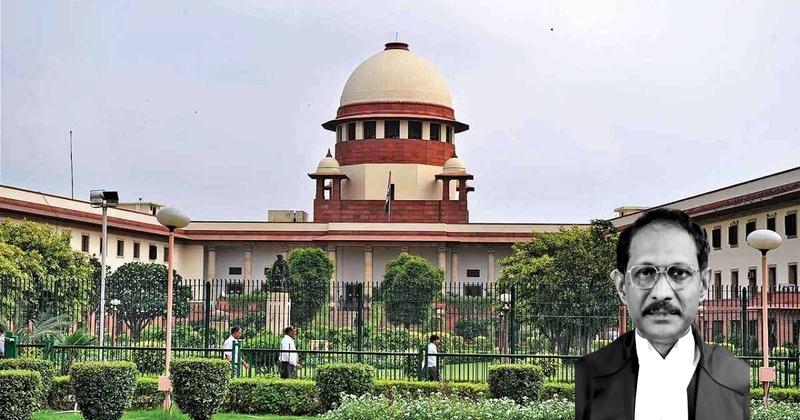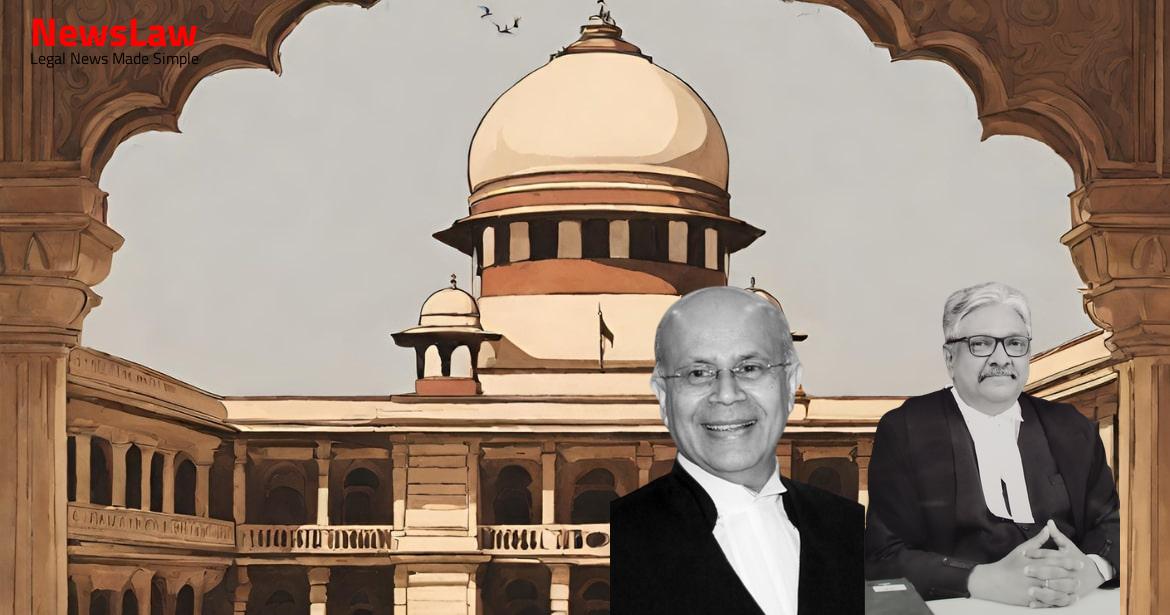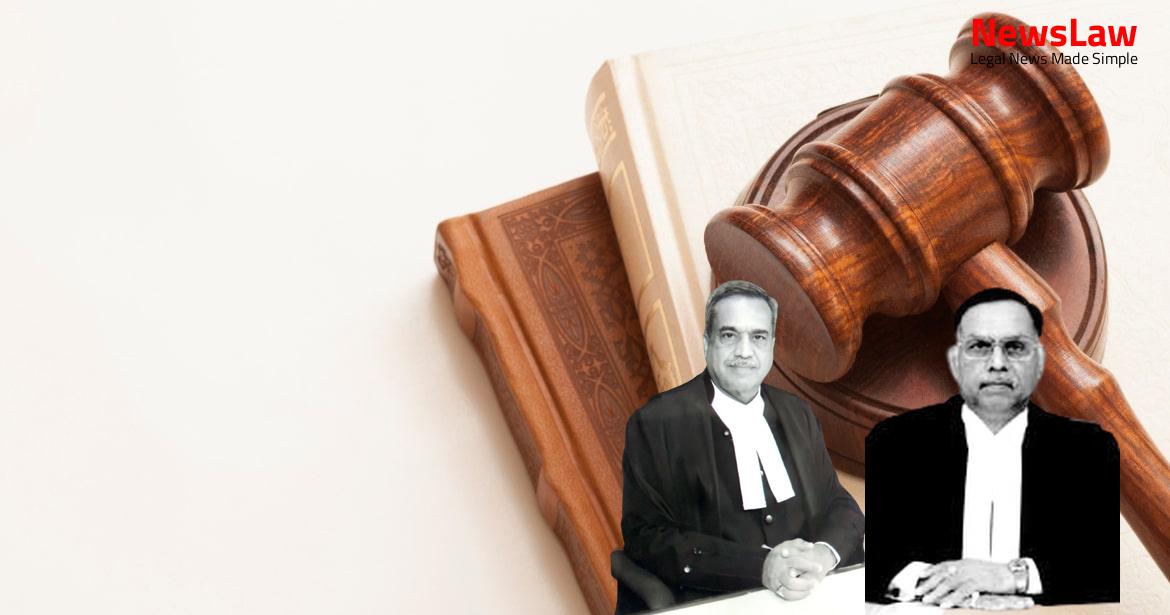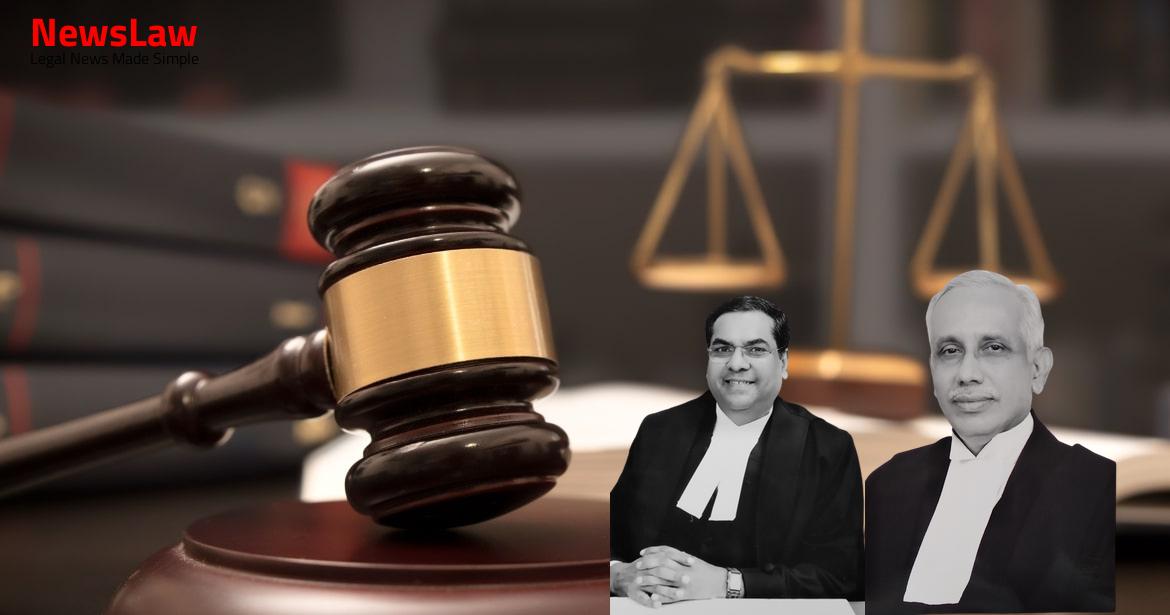Feeling aggrieved and dissatisfied with the impugned judgment and order dated 01.10.2021 passed by the High Court of Calcutta in Criminal Revision Application No 92/2021, by which the High Court has allowed the said revision application preferred by respondent no.1 herein – original complainant (victim) and has quashed and set aside order dated 12.11.2020 passed by the learned Chief Judicial Magistrate, Alipore (for short, ‘learned CJM’) rejecting the petition filed by respondent no.1 herein – original complainant under Section 156(3) of the Code of Criminal Procedure,1973 (Code/Cr.PC) original respondent nos. It was further alleged that since the filing of the charge sheet, she was pressurised by the appellants, namely, Pradeep Joshi, Jishnu Basu and Kailash Vijayvargiya, national level leaders of the said party to withdraw the case against Amalendu Chattopadhyay. On the pretext of having a discussion over the said matter, the appellants asked her to come at the residential apartment of accused – Kailash Vijayvargiya. It appears that the respondent informed the Officer in Charge of Behala Police Station on 14.08.2020 about the alleged rape by the accused persons allegedly on 9.8.2018. According to the complainant, despite the aforesaid complaints to the various authorities making specific allegations against the accused persons having committed a rape upon her on 29.11.2018, FIR has not been lodged and no investigation has been carried out and therefore she filed an application in the Court of the learned CJM, Alipore under Section 156(3) Cr.P.C. Government of Uttar Pradesh and others, reported in (2014) 2 SCC 1 and holding that as held by this Court in the case of Lalita Kumari (supra), the police authority in case of preliminary inquiry prior to the registration of a case concerning cognizable offence, has no jurisdiction to verify the veracity of the allegations and therefore a Magistrate cannot verify the truth and veracity of the allegations contained in the application under Section 156(3) Cr.P.C. 5 Feeling aggrieved and dissatisfied with the impugned judgment and order passed by the High Court, quashing and setting aside the order passed by the learned CJM dated 12.11.2020 dismissing the application under Section 156(3) Cr.P.C.
It is submitted that therefore the learned CJM was well within its jurisdiction to verify the truth and veracity of the allegations made in the application when such serious allegations were made after a period of almost two years after the date of the alleged incident and that in between though number of other complaints were filed against the accused and others, at no point of time, any allegation of rape on 29.11.2018 was made. 5
It is submitted that the observations made by the High Court in the impugned judgment and order that while considering the application under Section 156(3) Cr.P.C., Magistrate has no jurisdiction to even prima facie verify the truth and veracity of the allegations made in the application are just contrary to the law laid down by this Court in the case of Priyanka Srivastava v. State of Gujarat, reported in (2015) 6 SCC 439 and decision of this Court in the case of Suresh Kankra v. It is submitted that if the learned Single Judge of the High Court was of the opinion that the view taken in the case of Mukul Roy (supra) is not a correct law, in that case, propriety demands that the learned Single Judge ought to have referred the matter to the larger Bench, rather than taking a contrary view.
It is submitted that if he had committed the rape on 29.11.2018, as alleged, in that case, subsequently there was no reason for her to send emails and messages to the appellant – Kailash Vijayvargiya. 12 It is submitted that thereafter one another complaint dated 6.2.2020 was filed, however, there was no mention of any particular date of the alleged rape incident. 13
It is further submitted by the learned Senior Advocates appearing for the respective appellants that while passing order dated 12.11.2020, the learned CJM made some pertinent observations to highlight that there was an inordinate delay in making the first police complaint against the alleged offence and that there existed sufficient inconsistencies to raise doubts regarding the truth and veracity of the allegations contained in the application under Section 156(3).
01/2018 against Amalendu Chattopadhyay and others was filed on 31.08.2018, that was much after the alleged rape by Kailash Vijayvargiya at Hotel Peerless Inn, however, even that complaint made to the Behala Police Station finds no mention of such incident. Therefore, considering the unexplained delay of about two years in making the complaint along with several inconsistencies in the allegations, the learned CJM concluded that allegations appear to be unbelievable and therefore rightly rejected Section 156(3) application of the complainant.
It is submitted that therefore the learned CJM committed no error in dismissing the application under Section 156(3) which ought not to have set aside by the High Court on wrong application of law holding that at the stage of considering the application under Section 156(3) Cr.P.C., the Magistrate has no jurisdiction at all to consider the truth and veracity of the allegations in the complaint/application. It is submitted that the directions issued by this Court in the case of Lalita Kumari (supra) shall be confined to the police and shall not be applicable to a Magistrate exercising the jurisdiction under Section 156(3) Cr.P.C. It is submitted that the complainant having realised the serious doubt that her delayed complaint casts upon the veracity of her allegations completely, before this Court in the counter affidavit, she has stated on oath and has come out with a case now that she had in fact lodged a complaint with the police against the alleged rape incident on 29.11.2018 by lodging complaint on the very next day at 11:00 a.m.at the Behala Police Station. It is submitted that during the pendency of the present proceedings, despite the fact that the present appeals were pending before this Court, the learned CJM has passed an order dated 08.10.2021 directing the Officer in Charge of Bhowanipore Police Station for treating the application as an FIR and pursuant to the order of the learned CJM, FIR No 221/2021 has been registered against the appellants. 4.1 It is submitted that the Constitution Bench judgment in the case of Lalita Kumari (supra) holds that a police officer cannot refuse to register an FIR if it discloses commission of a cognizable offence. 4.2
It is submitted that though the judgment in Priyanka Srivastava (supra) empowers the Magistrate to consider the credibility of the complainant and the acceptability of the allegations also at the stage of application under Section 156(3) Cr.P.C., in view of the prior decisions of this Court in the cases of Srinivas Gundluri and others v.
Hence, there cannot be a mismatch between the duty of the police officer under section 154(1) and the contours of the jurisdiction of the Magistrate under Section 156(3) at the pre-cognizance stage. It is submitted that alternatively if the learned Magistrate chooses not to refer the complaint to the police under Section 156(3), in any case, he could not have dismissed the complaint and must have proceeded to the stage of Section 200/202 Cr.P.C. 4.6 It is submitted that therefore, resort to Section 156(3) is also “taking action under the Code” and therefore the complaint does not cease to be a complaint because the complainant has inter alia requested for action under Section 156(3) also.
It is submitted that when presented with such a complaint, the Magistrate certainly has a discretion to make a pre-cognizance reference under Section 156(3) or alternatively take a post-cognizance action under Sections200/202 Cr.P.C. It is submitted that however as the concerned police officer failed to register an FIR and investigate into the matter, the Magistrate in exercise of powers under Section 156(3) has to direct registration of an FIR and direct the concerned police officer to investigate into the allegations made in the FIR. It is submitted that as mandated by the Constitution Bench judgment of this Court in the case of Lalita Kumari (supra), the moment a complaint discloses the ingredients of any cognizable offence, the registration of an FIR becomes mandatory and any investigation consequent thereto is to prima facie satisfy that an offence so alleged is apparently cognizable. 4 It is submitted that in the case of Priyanka Srivastava (supra), in paragraphs 29 & 30, it was observed that Magistrates were issuing process directing lodging of FIR in a stereotype and routine manner and therefore this Court observed and held that “to curb petitions from filing frivolous litigants, there should be prior applications under Sections 154(1) and 154(3) and that the petition under Section 156(3) should be supported by an affidavit”. It is submitted that the observations in paragraph 30, viz, in appropriate cases, the Magistrate could verify the truth and also verify the veracity of the allegations has to be read with the observations in earlier paragraphs wherein it was held that a Magistrate should take note of the allegations in entirety; the date of the incident and whether any cognizable case is remotely made out. 5 It is further submitted that noting the rise of crime against women, the Criminal Amendment Act (13 of 2013) was promulgated amending Section 154(1) Cr.P.C, Section 173(1A) Cr.P.C and Section 166A, IPC.
Melwani, reported in AIR 1970 SC 962, the Court before which the complaint was filed could not have thrown out the same on the sole ground that there has been delay in filing it. 9
Summing up the submissions, learned Senior Counsel appearing on behalf of the original complainant has submitted that on reading the decisions of this Court in the cases of Lalita Kumari (supra) and Priyanka Srivastava (Supra) harmoniously and the limited scope of enquiry at the stage of Section 156(3) application, the learned CJM erred in rejecting the application under Section 156(3) and therefore the High Court has rightly directed to register the complaint as FIR and investigate into the matter.
The learned CJM, by a detailed order and giving cogent reasons, dismissed the said application/complaint under Section 156(3) Cr.P.C and refused to direct the police to register an FIR. The order passed by the learned CJM was challenged before the High Court and by the impugned judgment and order, not agreeing with the view taken by the co-ordinate Bench of the High Court in the case of Mukul Roy (supra) and even not following the decision of this Court in the case of Priyanka Srivastava (supra), and following the decision of Constitution Bench of this Court in the case of Lalita Kumari (supra), the High Court has quashed and set aside the order passed by the learned CJM and has directed to re-consider the application under Section 156(3) Cr.P.C., in light of the observations made in the impugned judgment and order. Therefore, as such, the subsequent order passed by the learned CJM is a consequential order passed by the High Court on quashing and setting aside the order passed by the learned CJM dismissing the application/complaint. It is the case on behalf of the appellants that the High Court has materially erred in relying upon and/or following the decision of this Court in the case of Lalita Kumari (supra), while holding that at the stage of considering the application under 156(3) Cr.P.C., the Magistrate has no jurisdiction to verify the truth and veracity of the allegations. It is submitted that the powers exercised by the Magistrate at the stage of Section 156(3) Cr.P.C shall not be and/or cannot be equated with the powers to be exercised by the police officer under Section 154 Cr.P.C. Therefore, the main issue posed for the consideration of this Court is, whether in the facts and circumstances of the case, the learned CJM was justified in verifying the truth and veracity of the allegations at the stage of deciding the application under Section 156(3) Cr.P.C. Section 156 authorises a police officer in-charge of a Police station to investigate any cognizable offence without the order of a Magistrate. In each of the cases mentioned in clauses (a) and (b) to the proviso to sub-section (1) to Section 157, the officer in-charge of the Police station has to file a report giving reasons for not complying with the requirements of sub-section (1) and in a case covered by clause (b) to the proviso, also notify the informant that he will not investigate the case or cause it to be investigated.
The power under the Code to investigate generally consists of following steps: (a) proceeding to the spot; (b) ascertainment of facts and circumstances of the case; (c) discovery and arrest of the suspected offender; (d) collection of evidence relating to commission of offence, which may consist of examination of various persons, including the person accused, and reduction of the statement into writing if the officer thinks fit; (e) the search of places of seizure of things considered necessary for investigation and to be produced for trial; and (f) formation of opinion as to whether on the material collected there is a case to place the accused before the Magistrate for trial and if so, taking the necessary steps by filing a chargesheet under Section 173 The question, whether the Police is bound to register a First Information Report (FIR) for a cognizable offence under Section 154 on receiving the information as such or has some latitude for conducting preliminary inquiry before registration of FIR, had led to the decision of the Constitutional Bench in Lalita Kumari (supra). Drawing on several earlier judgments and the language of Section 154 of the Code, it was held that the Police is bound to proceed to conduct investigation, even without receiving information about commission of a cognizable offence if the officer in-charge otherwise suspects the commission of such an offence.
This being the legal position, there is no reason that there should be any discretion or option left with the Police to register or not to register an FIR when information is given about commission of a cognizable offence. The requirement of Section 157(1) for the Police officer to start investigation is that he has “reason to suspect the commission of an offence”. Here, the Magistrate can direct the Police to investigate, or if he thinks fit, hold an inquiry. While ensuring and protecting the rights of the accused and the complainant, a preliminary inquiry should be made time bound and in any case it should not exceed fifteen days generally and in exceptional cases, by giving adequate reasons, six weeks’ time is provided. The power of the Magistrate is conferred once a report in terms of Section 157 or a report under Section 173(3) is submitted by the Police before the Magistrate. Once an offence is disclosed, an investigation into the offence must necessarily follow in the interest of justice.
Bhajan Lal and others, 1992 Supp (1) SCC 335, while clarifying that it is not laying down any precise formula or an exhaustive list, highlighted the cases in which the power to quash an FIR can be exercised as: “ 102. (2) Where the allegations in the first information report and other materials, if any, accompanying the FIR do not disclose a cognizable offence, justifying an investigation by Police officers under Section 156(1) of the Code except under an order of a Magistrate within the purview of Section 155(2) of the Code. (7) Where a criminal proceeding is manifestly attended with mala fide and/or where the proceeding is maliciously instituted with an ulterior motive for wreaking vengeance on the accused and with a view to spite him due to private and personal grudge.” One would grant that the jurisdiction of the Court when asked to invoke power under Section 156(3) is wider as held in Priyanka Srivastava (supra), yet there are limits within which the Magistrate must act. Power of the Magistrate to direct registration of an FIR under Section 156(3) in contrast with post-cognizance stage power under Section 202 of the Code. A three Judge Bench decision of this Court in Ramdev Food Products Private Limited (supra) had examined the distinction between powers of the Magistrate to direct registration of an FIR under Section 156(3) and power of the Magistrate to proceed under Section 202 of the Code. The proviso to Section 202 states that no direction for investigation shall be made where a complaint has not been made by a Court, unless the complainant and the witnesses present (if any) are examined on oath under Section 200.
Process to the accused under Section 204 falls under Chapter XVI of the Code and is issued post the cognizance and inquiry/investigation/evidence recorded in a private complaint in terms of Section 202 of the Code. In Ramdev Food Products Private Limited (supra), examining whether discretion of the Magistrate to call for a report under Section 202 instead of directing investigation under Section 156(3) is controlled by any defined parameters, it was held thus: “ 22. In this Court in Priyanka Srivastava (supra) referred to the nature of power exercised by the Magistrate under Section 156(3) of the Code and after referring to several earlier judgments held that the direction for registration of an FIR should not be issued in a routine manner. However, the Magistrate also has the power to take cognizance and take recourse to procedure under Section 202 of the Code and postpone the issue of process where the Magistrate is yet to determine existence of sufficient ground to proceed. Reiterating Lalita Kumari (supra), it was observed that an action under Section 156(3) should not be entertained without the complainant taking recourse to sub-section (1) and (3) of Section 154 and compliances of these two Sections should be clearly spelt out in the application and necessary documents filed. The clear position therefore is that any Judicial Magistrate, before taking cognizance of the offence, can order investigation under Section 156(3) of the Code. Even if a Magistrate does not say in so many words while directing investigation under Section 156(3) of the Code that an FIR should be registered, it is the duty of the officer in charge of the Police station to register the FIR regarding the cognizable offence disclosed by the complainant because that Police officer could take further steps contemplated in Chapter XII of the Code only thereafter.” In Anju Chaudhary (supra), this court analysing the power of the Magistrate under Section 156(3) observed: “41. State of Maharashtra, (2017) 1 SCC 640, this court while interpreting the words “may take cognizance” and Section 156(3), held: “24.
……to enable the Magistrate to form an opinion as to whether process should be issued or not and to remove from his mind any hesitation that he may have felt upon the mere perusal of the complaint and the consideration of the complainant’s evidence on oath. No doubt, as stated in sub-section (1) of Section 202 itself, the object of the enquiry is to ascertain the truth or falsehood of the complaint, but the Magistrate making the enquiry has to do this only with reference to the intrinsic quality of the statements made before him at the enquiry which would naturally mean the complaint itself, the statement on oath made by the complainant and the statements made before him by persons examined at the instance of the complainant.” Counsel for the accused, on the other hand, have highlighted the complainant’s conduct, which it is submitted, is contradictory to her explanation for the delay. The complainant subsequently filed another complaint dated 6 February 2020, wherein there is no mention of that particular case of the alleged rape incident. The preliminary inquiries conclude that in the communications made to the police between 2018 to 2020, there is no allegation that rape took place on 29 November 2018. Right from the inception of the judicial system, it has been accepted that discovery, vindication and establishment of truth are the primary purposes underlying the existence of the courts of justice. Abuse of law must be checked, if possible, at the very threshold, albeit when it is possible and also as per the procedure prescribed by law. Truth, like song, is whole and half-truth can be noise; Justice is truth, is beauty and the strategy of healing injustice is discovery of the whole truth and harmonising human relations.
and another, (2001) 2 SCC 628 which distinguishes between the power of the police to investigate under Section 156, the direction of the Magistrate for investigation under Section 156(3) and post-summoning inquiry and investigation after cognizance under Section 190 and Section 202 of the Code. An order under Section 156(3) is in the nature of a peremptory reminder or intimation to the police to exercise its plenary power of investigation under Section 156(1). We do not intend to go into the question of the merits of the allegations, and what procedure the Magistrate should follow as this is an aspect which the Magistrate must first consider and decide judiciously and as per the law. However, the law gives them a right to appear before the revisionary court in proceedings, when the complainant challenges the order rejecting an application under Section 156(3) of the Code.
To be fair to them, the copies of the papers and documents filed before the High Court and this Court would also be forwarded and kept on record of the Magistrate who would, thereupon, examine and consider the matter.
Case Title: KAILASH VIJAYVARGIYA Vs. RAJLAKSHMI CHAUDHURI (2023 INSC 494)
Case Number: Crl.A. No.-001581-001581 / 2021



